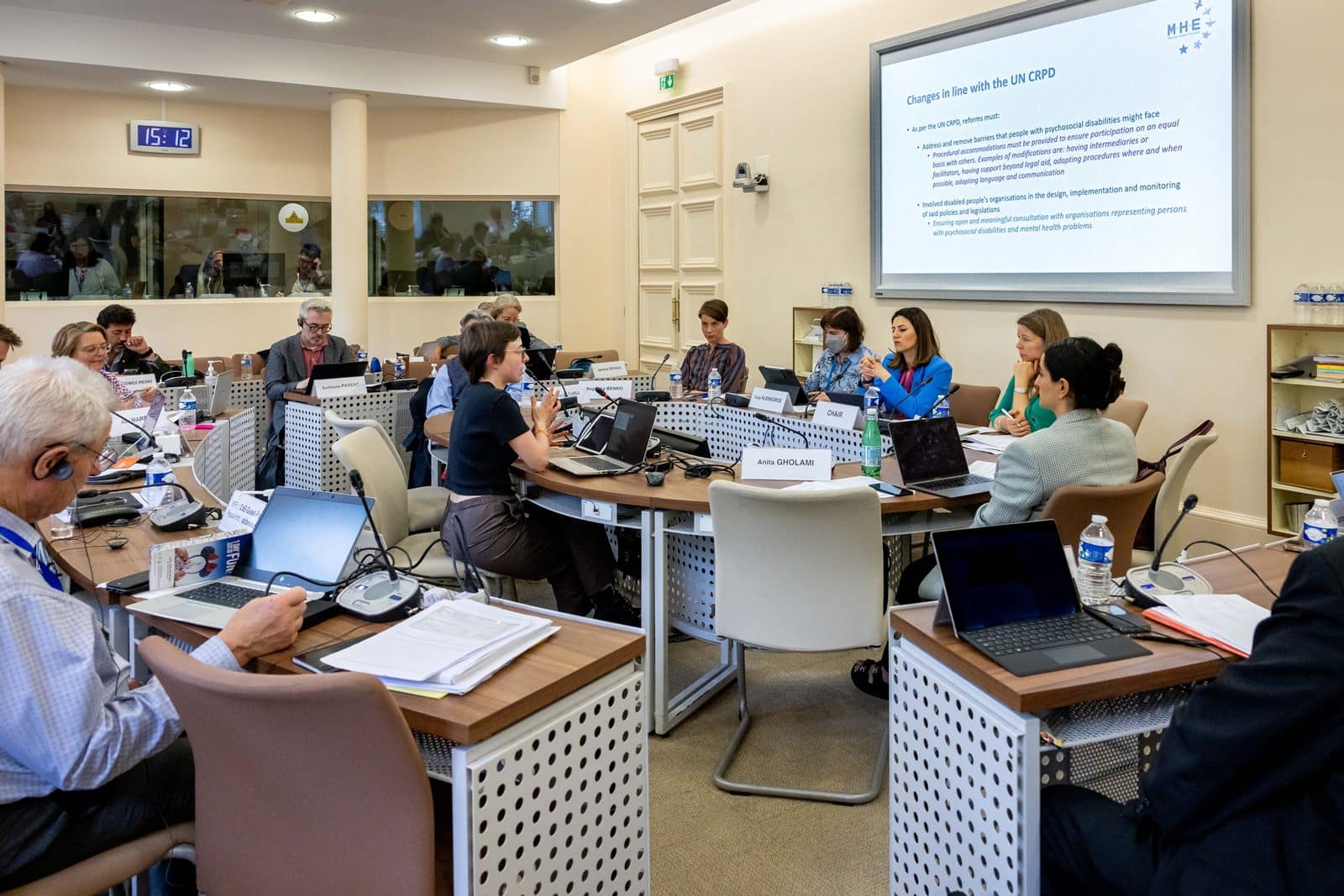The Parliamentary Assembly of the Council of Europe hearing with experts held last week looked into the discriminatory ideology at the root of why the European Convention on Human Rights (ECHR) limits the right to liberty and security of persons with psychosocial disabilities. At the same time, the Committee heard what the modern human rights concept promoted by the United Nations lays out.
The ECHR and ‘unsound mind’
As the first expert Prof. Dr. Marius Turda, Director of the Centre for Medical Humanities, Oxford Brookes University, UK described the historical context in which the European Convention on Human Rights (ECHR) had been formulated. Historically, the concept of ‘unsound mind’ used as a term in the ECHR Article 5, 1(e) – in all its permutations – played a significant role in shaping eugenic thinking and practice, and not only in Britain where it originated.
Prof. Turda laid out that, “it was deployed in a variety of ways to stigmatise and dehumanise individuals and also to advance discriminatory practices and marginalisation of individuals with learning disabilities. Eugenic discourses as to what constituted normal/abnormal behaviours and attitudes were centrally framed around representations of mentally ‘fit’ and ‘unfit’ individuals, and ultimately led to significant new modes of social, economic, and political disenfranchisement and the erosion of rights for women and men labelled of ‘unsound mind’.”
Ms Boglárka Benko, Registry of the European Court of Human Rights (ECtHR), presented the case law of the European Convention on Human Rights (ECHR). As part of this, she indicated the problem that the Convention text exempts persons deemed of “unsound mind” from the regular protection of rights. She noted that the ECtHR has only very limited regulated its interpretation of the Convention text in regards to the deprivation of liberty of persons with psychosocial disabilities or mental health problems. The courts in general follow the opinions of medical experts.
This practice is in contrast to other chapters of the European Convention on Human Rights (ECHR), where the European court more clearly has considered the human rights violation of cases per the ECHR while also looking at other international human rights instruments. Boglárka Benko noted that the Human rights protection may thus be in danger of fragmentation.

Another expert, Laura Marchetti, Policy Manager of Mental Health Europe (MHE) delivered a presentation on the human rights dimension of the detention of persons of psychosocial disabilities. MHE is the largest independent European network organisation working to Promote positive mental health and well-being; Prevent mental health problems; and support and advance the rights of people with mental ill-health or psychosocial disabilities.
“For a long time, people with psychosocial disabilities and mental health problems were often considered to be inferior, inadequate or even dangerous for society. This was the result of a biomedical approach to mental health, which framed the topic as an individual fault or problem,” Laura Marchetti noted.
She expanded on the historical discrimination which had been presented by Prof. Turda. “Policies and legislation developed following this approach notably legitimized exclusion, coercion and the deprivation of liberty,” she told the Committee. And she added that “people with psychosocial disability were framed as a burden or danger to society.”
Psychosocial model of disability
In the past decades, this approach has increasingly been questioned, as public debate and research started to point to the discrimination and flaws coming from a biomedical approach.
Laura Marchetti pointed out, that “Against this background, the so-called psychosocial model to disability posits that the problems and exclusion that persons with psychosocial disability and mental health problems face are not caused by their impairments, but by the way society is organised and understands this topic.”
This model also draws the attention to the fact that human experiences are varied and that there are a series of determinants impacting a person’s life (e.g. socio-economic and environmental factors, challenging or traumatic life events).
“Societal barriers and determinants are therefore the problem that should be addressed by policies and legislation. The focus should be on inclusion and support provision, rather than on exclusion and lack of choice and control,” Laura Marchetti pointed out.
This shift in approaches is enshrined in the United Nations Convention on the Rights of Persons with Disabilities (CRPD), which has the objective to promote, protect and ensure the full and equal enjoyment of all human rights by all persons with disabilities.
The CRPD has been signed by 164 countries, including the European Union and all its Member States. It enshrines into policies and laws the shift from a bio-medical approach to a psychosocial model of disability. It defined persons with disabilities as people who have long-term physical, mental, intellectual or sensory impairments which in interaction with various barriers may hinder their full and effective participation in society on an equal basis with others.

Laura Marchetti specified, that “The CRPD stipulates that individuals cannot be discriminated on the basis of their disability, including psychosocial disability. The Convention clearly indicates that any form of coercion, deprivation of legal capacity and forced treatment are human rights violations. Article 14 of the CRPD also clearly states that “the existence of a disability shall in no case justify a deprivation of liberty”.”

European Convention on Human Rights (ECHR), Article 5 § 1 (e)
The European Convention on Human Rights (ECHR) had been drafted in 1949 and 1950. In its section on the right to liberty and security of person, ECHR Article 5 § 1 (e), it notes an exception of “persons of unsound mind, alcoholics or drug addicts or vagrants.” The singling out of persons considered affected by such social or personal realities, or differences in viewpoints has its roots in widespread discriminatory viewpoints of the first part of the 1900s.
The exception was formulated by representatives of the United Kingdom, Denmark and Sweden, led by the British. It was based on a concern that the then drafted human rights texts sought to implement Universal human rights including for persons with psychosocial disabilities or mental health problems, which conflicted with legislation and social policy in place in these countries. Both the British, Denmark and Sweden were strong proponents of eugenics at the time, and had implemented such principles and viewpoints into legislation and practice.

Laura Marchetti concluded her presentation stating that
“In light of these changes, the current text of the European Convention on Human Rights (ECHR) Article 5, 1(e) is not in line with international human rights standards, as it still allows for the discrimination on the basis of a psychosocial disability or a mental health problem.”
“It is therefore crucial for the text to be reformed and to remove sections that allow for the perpetuation of discrimination and unequal treatment,” she emphasized in her final statement.





